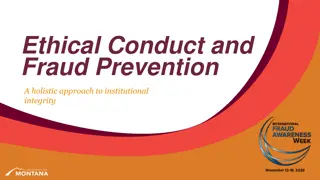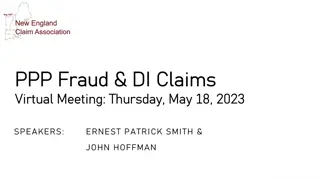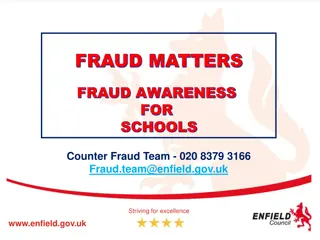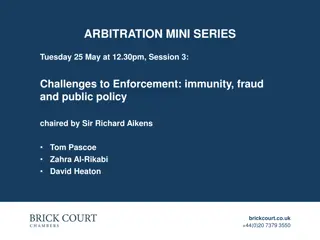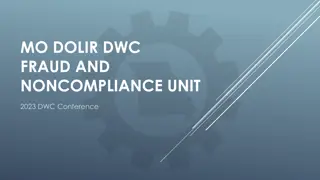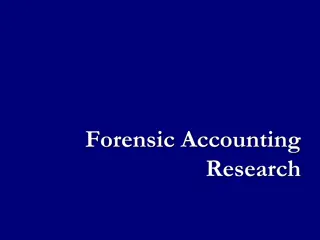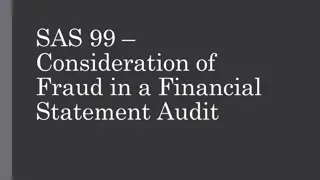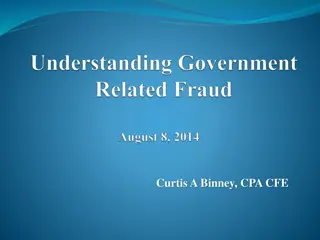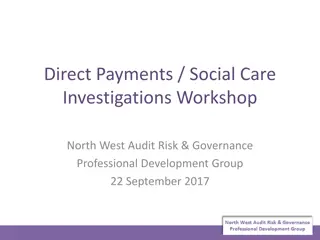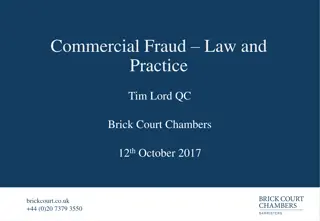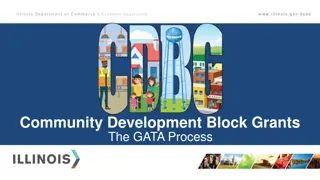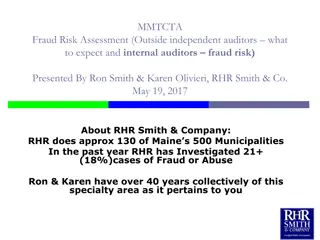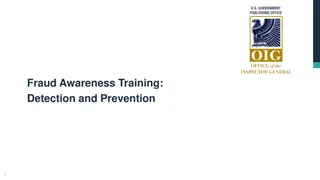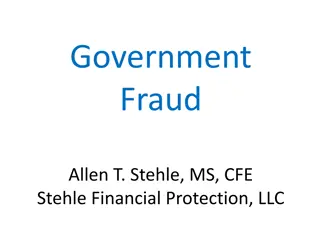Understanding Grants vs Contracts in Government Funding
Grants and contracts in government funding have distinct features and requirements that recipients must adhere to in order to avoid grant fraud and misuse of funds. Grant agreements are legally binding contracts with specific purposes, while contracts involve competition and justification for sole sourcing. Oversight mechanisms vary, emphasizing the importance of integrity in managing grant funds to prevent conflicts of interest and ensure transparent processes.
Download Presentation

Please find below an Image/Link to download the presentation.
The content on the website is provided AS IS for your information and personal use only. It may not be sold, licensed, or shared on other websites without obtaining consent from the author. Download presentation by click this link. If you encounter any issues during the download, it is possible that the publisher has removed the file from their server.
E N D
Presentation Transcript
Grants vs. Contracts $ 766 B. OMB Circulars / CFR s Application; Certifications Some competition; most awarded via a formula Integrity based system: oversight can vary Agency grant manager may manage dozens of grants. $586 B. FAR Solicitation, Claims Competition is preferred; sole source must be justified Multiple oversight mechanisms CO and COR for each K. Source: FY 2019 usaspending.gov
Grant funds are awarded for specific purposes and grantees must use them accordingly & follow the rules Grant Fraud = lying, cheating, or stealing anywhere in the process The consequences of grant fraud can include debarment from receiving future funding, administrative recoveries of funds, civil law suits and criminal prosecution or a combination of all or some of these remedies. Also damage to an organization s reputation. The three most common grant fraud schemes relate to a Conflict of Interest, Failure to support the use of award funds, and theft.
Pre-Award Post-Award Solicitation Application / Proposal Budget Certified Assurances Eligibility Certification Accept Grant Conditions INTEGRITY BASED SYSTEM INTEGRITY BASED SYSTEM Grantor Agency Policies Grantor Agency Policies Code of Federal Regulations Title Code of Federal Regulations Title 2 2 Section 200 Section 200 Formal Award Grantee Performance Financial Certifications Claims for Reimbursement Narrative Progress Reports Grantor Monitoring / Audits
FALSE The government audits 100% of draw down requests and verifies every month that all grantee spending is allowable and within approved budget categories.
Grantees are required to use federal funds in the best interest of their program and these decisions must be free of undisclosed personal or organizational conflicts of interest both in appearance and fact. The typical issues in this area include: Less than Arms-Length Transactions: purchasing goods or services or hiring an individual from a related party such as a family member or a business associated with an employee of a grantee. Sub grant award decisions and vendor selections must be accomplished using a fair and transparent process free of undue influence. Most procurements require full & open competition. Monitor your sub-recipients! 2 CFR 200 330-332 for Guidance. Consultants can play an important role in programs, however, their use requires a fair selection process, reasonable pay rates, and specific verifiable work product.
A grant agreement is essentially a legally binding contract and grantees are obligated to use their grant funds as outlined in the agreement and to act with integrity when applying for and reporting their actual use of funds. Grantees are also obligated to properly track the use of funds and maintain adequate supporting documentation. The typical issues in this area include: Unilaterally redirecting the use of funds in a manner different than outlined in the grant agreement. 10% rulefor awards > $150,000 Failing to adequately account for, track or support transactions such as personnel costs, contracts, indirect cost rates, matching funds, program income, or other sources of revenue. Grantees must accurately represent their eligibility for funding and cannot provide false or misleading information in their application or subsequent narrative progress or financial status reports.
Commingling of Funds The accounting systems of all recipients and sub- recipients must ensure that agency funds are not commingled with funds from other Federal or private agencies. You must account for each award separately. Recipients and sub-recipients are prohibited from commingling funds. Funds specifically budgeted and/or received for one project may not be used to support another. All recipients and sub-recipients are required to establish and maintain adequate accounting systems and financial records and to accurately account for funds awarded to them. Separate accounts are generally not required, but not a bad idea.
Risk Mitigation Examine your programs to identify fraud vulnerabilities. Ensure appropriate oversight (Executive Director, Board of Directors) and practice professional skepticism. Communicate any issues with your program office or the OIG. Maintain a well designed and tested system of internal controls. Poor or no internal controls virtually assures theft will occur. Ensure all financial or other certifications and progress reports are adequately supported with appropriate documentation and evidence. Identify any potential conflicts of interest issues and disclose them to the appropriate officials for specific guidance and advice. Ensure everyone involved in the grant process understands the conflict of interest prohibitions. Ensure there is a fair, transparent and fully-documented procurement process, especially when utilizing consultants. Ensure the rate of pay is reasonable and justifiable and that the work product is well-defined and documented.
A grantee that hires a consultant should clearly document answers to what five key questions? Why? Who? What? How? How Much?
Mistral Security, Inc Agrees to Pay $458,000 to Resolve Allegations That it Overbilled the Government on Two Government-funded Grants to Provide Drug Detection Kits Mistral Security, Inc. (MSI) located in Bethesda, Maryland has agreed to pay $458,000 to settle allegations under the False Claims Act that it mischarged the government for unapproved overhead costs in connection with two government- funded grants to provide certain school districts with aerosol-based drug detection kits. During a financial audit conducted in late January and early February 2007, the government found that MSI had billed the government for overhead costs that were not approved as part of the cooperative agreements, thereby inflating the cost of the drug detection kits. No approved indirect cost agreement in place. Company stated this was their way of making a profit. Source: Excerpted from a September 30, 2011, U.S. Department of Justice Press Release, District of Maryland
CONGRESSMAN CHAKA FATTAH AND FOUR ASSOCIATES CHARGED WITH PARTICIPATING IN A RACKETEETING CONSIPRACY Congressman Chaka Fattah Sr., 58, of Philadelphia; lobbyist Herbert Vederman, 69, of Palm Beach, Florida; Fattah s Congressional District Director Bonnie Bowser, 59, of Philadelphia; and Robert Brand, 69, of Philadelphia; and Karen Nicholas, 57, of Williamstown, New Jersey, were charged in a 29-count indictment with participating in a racketeering conspiracy and other crimes, including bribery; conspiracy to commit mail, wire and honest services fraud; and multiple counts of mail fraud, falsification of records, bank fraud, making false statements to a financial institution and money laundering. One of the alleged schemes involved the use of $600,000 in charitable donations and federal grant funds to pay off a campaign loan related to Fattah s failed 2007 campaign to serve as mayor of Philadelphia. * Fattah was found guilty of all 23 charges in June 2016 and sentenced to 10 years in federal prison in December 2016. Source: Excerpted from a July 29, 2015, U.S. Department of Justice Press Release
Former E/D, Office Manager and Legal Assistant of American Samoa Non- profit Sentenced for Stealing Nearly $160,000 in Federal Grant Funds Between September 2005 and September 2007, Julie Matau and David Wagner arranged for themselves, Andrea Matau, and Julie and Andrea Matau s relatives to receive unlawful payments from the federal grant funds. In her guilty plea, Julie Matau admitted that she knew that they had no legal entitlement to receive these federal grant funds and that their receipt of the federal funds violated the terms and conditions of the grants. Julie Matau also admitted that she had no intention of repaying the money to ULSC or the federal government, or of requiring others to repay the money. In his guilty plea, Wagner admitted that, with Julie Matau s assistance, he received a number of unlawful salary advances. Wagner also admitted that he signed blank ULSC checks for Julie Matau s use in exchange for the unlawful payments that she provided to him. No Board oversight during this period! Source: Press Release, U.S. Attorney s Office for the Northern District of California March 28, 2012
Grant Guidance OMB s Uniform Administrative Requirements, Cost Principles, and Audit Requirements for Federal Awards 2 CFR 200 ( Uniform Guidance ). Implemented December 2014, supersedes prior OMB circulars. The 2017 DOJ Grants Financial Guide serves as the primary reference manual to assist OJP, OVW, and COPS Office award recipients. Section 3.19 gives top audit findings for 2014. Nice cheat sheet of areas of concern that auditors are seeing when they conduct audits of DOJ grantees Internal Control weaknesses, lack of sub-recipient monitoring, inadequate accounting systems, FSRs not prepared timely or not supported, etc.
Uniform Guidance 2 CFR 200.113 Mandatory Disclosures Must disclose, in a timely manner, in writing to the Federal awarding agency or pass-through entity all violations of Federal criminal law involving fraud, bribery, or gratuity violations potentially affecting the Federal award. Failure to make required disclosures can result in any of the remedies described in 217 200.338 Remedies for noncompliance, including suspension or debarment. (See also 2 CFR Part 180 and 31 U.S.C. 3321).
National Defense Authorization Act of 2013 (NDAA) While a variety of strong whistleblower protections exist related to certain classes of individuals, including Federal employees, NDAA strengthens those protections NDAA makes it illegal for an employee of a Federal contractor, subcontractor, or grantee to be discharged, demoted, or otherwise discriminated against for making a protected whistleblower disclosure Under NDAA, the DOJ OIG has jurisdiction to investigate allegations of reprisal for whistleblowing by employees of DOJ contractors, subcontractors, and grantees Additional information about whistleblower rights and protections, including how to report suspected reprisal, can be found at: https://oig.justice.gov/hotline/whistleblower-protection.htm
Andrew Hartwell 703-413-1865 ahartwell@OIG.USDOJ.GOV U.S. Department of Justice Office of the Inspector General oig.hotline@usdoj.gov www.usdoj.gov/oig 1-800-869-4499






